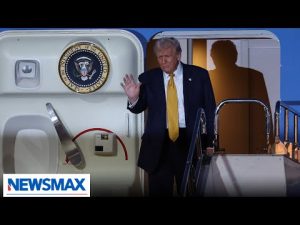In a world where geopolitics often seems as confusing as a squirrel in a nut factory, Sebastian Gorka has stepped into the spotlight to clarify America’s stance toward Latin America. As the Senior Director for Counterterrorism at the White House, Gorka recently detailed the Trump administration’s vision for the region, asserting that the approach taken under previous Democratic administrations was anything but beneficial. Instead, he argues that current policies are firmly rooted in the traditional MAGA doctrine—Make America Great Again—by focusing on stability and safety in the Western Hemisphere.
Gorka kicked things off by invoking the Monroe Doctrine, a historical cornerstone of American foreign policy that suggests, quite plainly, that the affairs of neighboring countries are crucial to the United States. He illustrated this with a vivid analogy, emphasizing that if something goes awry next door, it could directly affect one’s own “house.” With problems like fentanyl trafficking costing the lives of over 110,000 Americans each year, it becomes clear why Gorka believes that a stable hemisphere is critical for national security and economic health. But what does that mean for countries like Argentina, Colombia, and Venezuela?
Traditional U.S. aid has often taken the form of cash to keep countries stable, hoping to stem emigration and chaos near our southern border. However, under the Trump administration, Gorka suggests a refreshing twist on this old tactic. Rather than simply throwing money at issues, the administration seeks to actively support capitalist leaders who share American values. This means standing against the creeping socialism and communism that have taken root in some parts of Latin America. It’s about fostering countries that function as truly sovereign entities, rather than ideologically driven regimes that disregard a nation’s right to self-government.
In a somewhat cheeky moment, Gorka dismissed concerns regarding the infamous Nicolás Maduro of Venezuela, highlighting the Twitter-sphere’s ongoing chatter about whether he could stay in power. The reality, Gorka explained, is that the U.S. does not engage in regime change—thank you, neoconservatives of the Bush era. Instead, the focus remains steadfast on supporting those who embody the values of Judeo-Christian democracy, laying out a robust framework for reform that respects national borders and sovereignty.
Amidst Gorka’s reflections on Latin America, he made a point to draw attention to counterterrorism efforts showcasing significant achievements in neutralizing jihadist threats. With 370 suspected jihadists reportedly eliminated since taking office, Gorka underscores a stark departure from the previous four years, when military actions were reportedly stifled by restrictions. By empowering combat commanders to act against leading jihadists, this administration is making strides in bolstering American safety, and Gorka takes a level of pride in the progress made on this front.
In summary, while the world may sometimes feel like it’s spinning faster than a hamster in a wheel, Gorka’s insights provide clarity on America’s foreign policy direction. By advocating for cooperation with like-minded nations and pushing back against anti-American ideologies in Latin America, the Trump administration aims to stabilize the region, thereby enhancing the safety and security of the United States. With every action that unfolds in our hemisphere, it is imperative to remember that what happens next door truly does matter—it’s about keeping the American family secure and intact.







